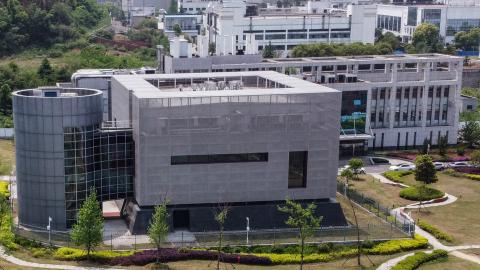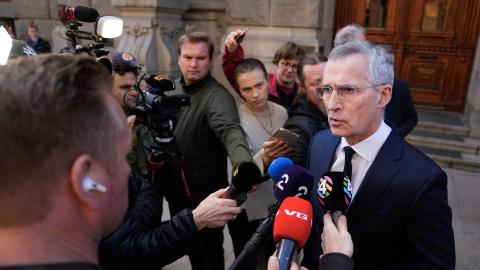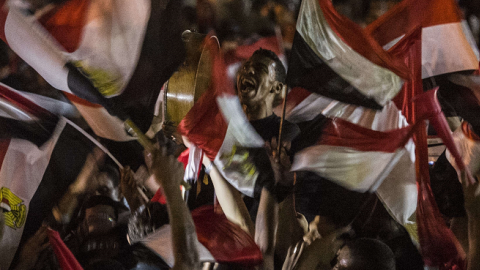That Egypt's revolution has failed is hardly disputable today. The excitement of those magical eighteen days in Tahrir Square and the hopes of a dawn of democracy in Egypt are long gone. Replacing them is widespread despair among Egypt's revolutionary activists and their international cheerleaders.
For those lamenting the failure of a revolution that captivated the world, the blame is usually placed on two forces: Egypt's military and the Muslim Brotherhood. A military that never accepted the notion of civilian control and that aimed to protect its exclusive domination of the state and its economy, and a Brotherhood that ruled in a noninclusive manner and alienated many segments of Egypt's population - these have formed the basis of the explanations given by analysts as to why Egypt reached the state it is in today.
Remarkably little attention has been given to the actions and choices of Egypt's non-Islamist revolutionaries. Besides the usual criticism of their organizational weakness and the more recent critical look at those among them who supported the military coup, they have largely escaped any critical examination and hence blame.
This is all the more surprising given the fact that, three years earlier, when the crowds occupied Tahrir Square, both the media and Western analysts fixed their gazes on those young men and women, often described as liberals, democrats, moderates and secular, to the extent of seeing nothing but them. Egypt's revolutionaries were hailed as the heroic force that ended what seemed like an eternal dichotomy between repressive authoritarian regimes and totalitarian Islamists.
The lack of scrutiny of Egypt's revolutionaries creates a serious gap in our understanding of the events that unfolded in the past three years. From their decision to call for mass demonstrations on 25 January 2011, their rejection of participating in politics, their calls for an end to the Supreme Council of the Armed Forces (SCAF) rule, their continuous demonstrations and violent clashes with the police, and the choices they made in the parliamentary and presidential elections, Egypt's revolutionaries were not helpless victims but actors who affected and shaped the direction of the country.
The imaginary Egypt of the revolution
The feeling of jubilation in Tahrir Square on 11 February 2011 as Omar Suleiman read Mubarak's resignation was indescribable. That night, hardly anyone slept as hundreds of thousands celebrated in the streets. The next day, they woke up to a question: What happens next? In reality, no one knew. No one had ever given that question much thought let alone prepared for that day. The people had united in their demand for Mubarak to step down; what comes after was anyone's guess.
The accidental coalition that led to the fall of Mubarak was bound to collapse. The core of the conflict centred on the question of who had achieved that task: was it the army with its decision to side with the people, the Muslim Brotherhood for providing the troops necessary to turn a demonstration into a revolution, the ordinary men and women who suddenly rose after having been apathetic for decades, or the core of the revolutionaries - those who had struggled for years against the regime and then demolished the first brick in the regime's wall of oppression?
The claim of ownership of the revolution was not an abstract question, and it would have profound ramifications. Ownership meant entitlement, entitlement to set the future course of the country, maybe even entitlement to rule. No group faced a harder dilemma over the question of the future than the revolutionaries. Young and old alike, veteran activists had devoted their lives to the fight against Mubarak. Now that the object of their hatred was gone, what were they to do with their lives?
The eighteen magical days in Tahrir were not only the culmination of years of struggle, but also their most glorious moment. The world was captivated by their struggle, journalists were flocking to interview them, and their faces were on the cover of magazines. There was life before Tahrir, and then there was life in Tahrir. There was the life of failure, frustrations and depression; and then there was the life of success, glory, and pride. Many of them would later speak of those eighteen days in mythological terms - poor and rich standing side by side, Christian and Muslim, men and women, no hatreds or differences, millions of Egyptians, all united by love of country.
Soon the square became Egypt, and they became the revolution. The Egypt of their imagination was a simple one. Egypt was a rich country, yet its people were poor. The reason for their poverty was Mubarak and his corrupt regime. Once corruption was ended - and in the world they constructed, corruption could magically end - Egypt would become prosperous. Legends about Mubarak's wealth were proclaimed. The man had stolen anywhere from $70 billion to $5 trillion. That money, once returned, would transform Egypt.
Reality was, of course, quite different. There were never the imagined millions in Tahrir Square in the first place. The square with all its surrounding streets could barely hold 400,000 to begin with. Most of the country had not participated in the revolution; they watched the events on television and had little attachment to the fairy tale. While the revolutionaries would later lament their fate, arguing that their greatest mistake was leaving the square, as Harvard political scientist Tarek Masoud observed, the truth was strikingly different: "You didn't leave the Square. The rest of the country did."
Few Egyptians were saddened by Mubarak's resignation. For most Egyptians, however, the revolution had achieved its demand. Mubarak had resigned, and now we can all go back to finding food for our families. The economy was in trouble, tourists had disappeared, and the security situation was frightening. The military certainly agreed with that. For the revolutionaries, however, the revolution was not an event. It was a journey, and soon, one without any identified destination.
Less than forty-eight hours after Mubarak's resignation, a new million-man demonstration was announced, scheduled for 18 February, to celebrate victory and continue the revolution until it achieves all of its demands. Those demands were ever-growing. Some were at least clear: oust Ahmed Shafik's government, arrest Mubarak and former regime figures, end the state of emergency and fire the attorney general. Others were nothing more than slogans: social justice, an end to corruption, or independence of the judiciary.
One Friday to the next, the demonstrations never stopped. For a while their methods seemed to be working, as every week brought new development, more arrests of former Mubarak ministers, or news of the government resigning. Beneath the surface, the revolutionaries' isolation from the rest of the country was growing.
While the rest of the country was searching for a return to normalcy, normalcy was the last thing the revolutionaries wanted. Change was no longer the goal; the revolution itself became the goal. A Trotskyite motto, the permanent revolution, became theirs. The list of individuals and institutions that belonged to the old order and thus in need of purging continued to grow.
The "remnants of the old regime" became an all-encompassing designation. Everyone had a place on the list: the bureaucracy, judiciary, police, military, religious institutions, anyone who belonged to the previous ruling party, the media, businessmen. Little did the revolutionaries ponder the wisdom of their actions; little did they contemplate the hostility that would result.
Authority as a concept became scorned. The revolution became a revolution against everything old: tradition, respect, even decency. With their language becoming more and more abusive and their graffiti more vulgar, the revolutionaries' words soon turned into action. Violence would only be a matter of time.
The revolution had not been peaceful in the first place, but the cycle was deteriorating by the day. It became common for the revolutionaries to publicize the home addresses of those they hated on social media, thereby endorsing mob action against them. There had been torture in Tahrir during the revolution. Those suspected of being thugs or secret police were held and beaten. A confinement tent for suspected thugs became a common sight at the centre of the revolutionary camp in Tahrir.
The contradictions were glaring. The revolutionaries who claimed the mantle of human rights were practicing torture. Men who called for the rule of law came to think of themselves as above the law. People who argued for the freedom of the press demanded the silencing of all who criticized them. Champions of democracy rejected people's choices and proclaimed revolutionary legitimacy. Those who stood against military trials were calling for revolutionary trials for their opponents. They had no patience for justice. Instead, revolutionary justice became the motto.
Who betrayed the revolution?
Egypt could not be expected to wait in limbo until the revolutionaries finished their vendetta against the state. The revolution had unleashed forces long contained and suppressed by Mubarak's authoritarian grip on power. With the repressive hand removed, Pandora's box was suddenly opened. Workers were demanding higher wages, Copts an end to their discrimination, Islamists an Islamic state, women equality, retirees higher benefits. The demands were endless. Even police officers were striking for better pay. The revolution had unleashed a colossal euphoria of expectations, and delivery on all fronts was eagerly awaited.
Upon assuming power, the military had promised a swift transition to democracy and power transfer in six months. The process of amending the Constitution had been initiated by Mubarak in his last days in power, but it was now more urgent than ever. Who would write the Constitution became the first battle that split those who had united in toppling Mubarak. The Muslim Brotherhood, the best organized and most popular movement in the country, was naturally in favour of a fast-track transition. Non-Islamists on the other hand, were frightened. A swift transition would mean a Brotherhood victory. They needed more time to organize. Like the Brotherhood and other Islamists, the military favoured a yes vote.
The 19 March referendum became a test of size and appeal. Results weren't even close. A whopping 77% of the electorate voted against non-Islamists. In a repeated phenomenon, whenever they were faced with failure, non-Islamists would join their revolutionary brethren in blaming anyone but themselves. Mubarak, they insisted, had allowed the Islamists to grow. In reality, as Tarek Masoud wrote, "If the movement had a head start over liberals, it is not because it had an easier time under Mubarak, but rather - as Brotherhood members are likely to aver - because they have worked harder. No delay in elections will change that."
The revolutionaries and the larger non-Islamist camp were growing more isolated from the rest of the country. Isolation gave birth to delusions, and when delusions ultimately met reality, they either grew more delusional or developed into bitterness and disdain. As the months went by and it became obvious that the majority of Egyptians did not share the revolutionaries' euphoria, the condescension began. Instead of being a heroic people, Egyptians were now called "a slave people" used to submission to the extent of developing Stockholm syndrome, who didn't deserve the revolutionaries' sacrifices.
In the following months, a Jacobin discourse dominated the revolutionaries' worldview. Anyone who did not share their quest for the continuous revolution was a traitor and thus not true revolutionaries. Even old comrades of the square who advocated caution and compromise were showered with contempt. Politicians were frightened. If they dared suggest that perhaps it was time to put an end to the demonstrations game and start playing politics, they were putting themselves at risk of being painted as enemies of the revolution.
Politics was not only a game the revolutionaries refused to play; it was also one they completely disdained. Looking back, that was hardly surprising. The cause of their success in toppling Mubarak was the reason for their failure thereafter. The appeal to abstract principles and empty slogans was instrumental in uniting people against a dictator but was meaningless as a program of elections and governance; the mobilization outside parties was necessary for a revolution but incapable of winning elections.
But the revolutionaries' worst offense was their complete ignorance of the country they sought to transform. Their imaginary Egypt had no relationship to the actual Egypt. When Salafis began demanding an Islamic state, many a revolutionary expressed surprise and admitted not knowing Salafis existed in Egypt. When attacks on Christians intensified, many a revolutionary were astonished by the level of sectarianism in the country. When Egyptians elected Islamists to Parliament, the revolutionaries could not understand why they didn't vote for the revolution's party. When Mohamed Morsi and Ahmed Shafik received the highest number of votes in the first round of the presidential election, there was genuine shock among the revolutionaries.
***
Today, Egypt's former revolutionaries are split between the submissive and the delusional, between those who have become no more than cheerleaders for a military coup and those who continue to dream of an endless revolution.
After the revolution and its hopes and disappointments, Egypt finds itself in a world it knows all too well - faith in the deliverance offered by one man. The hope is now invested in a military commander, Abdel Fattah el-Sisi. It is dictatorship by demand, as it were. The country has been here before. For two decades, from 1954 to 1970, Gamal Abdel Nasser gave Egypt its moment of enthusiasm and then led it to defeat and heartbreak.
It would take a leap of faith, and luck beyond what history offers, to believe that this faith in a redeemer will yield a better harvest than the one before it.



















